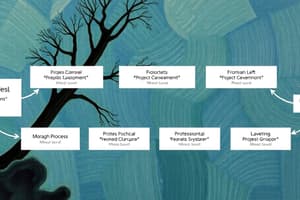Podcast
Questions and Answers
What is the main purpose of a process model in software engineering?
What is the main purpose of a process model in software engineering?
- To facilitate communication amongst team members. (correct)
- To provide entertainment during the development process.
- To define programming languages used in development.
- To increase coding speed over quality.
Which of the following is NOT a component of a process model?
Which of the following is NOT a component of a process model?
- Documentation (correct)
- Milestones
- Activities
- Phases
What disadvantage does the V-Model inherit from the Waterfall model?
What disadvantage does the V-Model inherit from the Waterfall model?
- It does not support incremental development.
- Changes can be costly and difficult to implement once phases are completed. (correct)
- It requires frequent stakeholder feedback.
- It leads to faster development times.
Which phase in the V-Model corresponds with Unit Testing?
Which phase in the V-Model corresponds with Unit Testing?
In the context of a process model, what do 'milestones' represent?
In the context of a process model, what do 'milestones' represent?
What is one advantage of the Incremental Model?
What is one advantage of the Incremental Model?
Which model is described as a linear and sequential approach where phases must be completed before the next begins?
Which model is described as a linear and sequential approach where phases must be completed before the next begins?
What advantage does the Waterfall Model offer?
What advantage does the Waterfall Model offer?
During which phase of the V-Model does Acceptance Testing occur?
During which phase of the V-Model does Acceptance Testing occur?
Which of the following is a critical aspect of developing a medical software system?
Which of the following is a critical aspect of developing a medical software system?
What does planning in a process model help with?
What does planning in a process model help with?
What is a possible drawback when using the Waterfall Model?
What is a possible drawback when using the Waterfall Model?
How does the Incremental Model handle changes in requirements?
How does the Incremental Model handle changes in requirements?
How does risk management function within a process model?
How does risk management function within a process model?
What does the System Design phase correspond with in the testing phase of the V-Model?
What does the System Design phase correspond with in the testing phase of the V-Model?
Which development model builds software incrementally?
Which development model builds software incrementally?
What is a significant disadvantage of the software development process as described?
What is a significant disadvantage of the software development process as described?
During which phase of the software development process is actual code written?
During which phase of the software development process is actual code written?
Which model focuses on early detection of defects through corresponding testing phases?
Which model focuses on early detection of defects through corresponding testing phases?
What is a primary characteristic of the Waterfall Model?
What is a primary characteristic of the Waterfall Model?
What is one disadvantage of using the Waterfall Model for software development?
What is one disadvantage of using the Waterfall Model for software development?
Which of the following options describes the Maintenance phase of software development?
Which of the following options describes the Maintenance phase of software development?
What is true about the requirements during the implementation of a project in the Waterfall Model?
What is true about the requirements during the implementation of a project in the Waterfall Model?
What describes the focus of the V-Model in terms of quality?
What describes the focus of the V-Model in terms of quality?
What is a disadvantage of using the Incremental model in software development?
What is a disadvantage of using the Incremental model in software development?
In which scenario would the Waterfall model be most appropriate?
In which scenario would the Waterfall model be most appropriate?
Which factor significantly influences the choice of a project process model?
Which factor significantly influences the choice of a project process model?
What approach is recommended for projects with evolving requirements?
What approach is recommended for projects with evolving requirements?
Which of the following is NOT a factor that influences the selection of a process model?
Which of the following is NOT a factor that influences the selection of a process model?
When might tighter deadlines favor an iterative approach?
When might tighter deadlines favor an iterative approach?
What is a key characteristic of the Incremental model?
What is a key characteristic of the Incremental model?
Which project example might benefit most from an Agile methodology?
Which project example might benefit most from an Agile methodology?
Flashcards are hidden until you start studying
Study Notes
Process Models in Software Engineering
- Process model : Structured framework outlining tasks, activities, and roles in software development.
- Purpose and Importance:
- Planning: Provides a timeline and resource allocation.
- Communication: Creates a common language for stakeholders (developers, managers, clients).
- QA: Ensures phases meet standards before proceeding.
- Risk management: Identifies potential risks early.
Components of a Process Model
- Phases: Distinct development stages (e.g., requirements, design, implementation).
- Activities: Specific tasks within each phase.
- Milestones: Indicate the end of a phase or important tasks.
Waterfall Model
- Description: A linear and sequential approach in which each phase must be completed before the next begins.
- Phases:
- Requirements Analysis: Gathering and documenting software functionalities.
- System Design: Defining the architecture and design of the system.
- Implementation (Coding): Writing the actual code.
- Testing: Combining all parts and testing for defects.
- Deployment: Releasing the software to users.
- Maintenance: Ongoing support and updates.
- Advantages:
- Simple and easy to understand.
- Well-structured with clear milestones.
- Suitable for projects with well-defined requirements.
- Disadvantages:
- Inflexible to changes once the process is underway.
- Late discovery of issues since testing occurs after implementation.
- Not ideal for complex or long-term projects where requirements may evolve.
- Example: Developing a static website where requirements are unlikely to change significantly during development.
V-Model (Verification and Validation Model)
- Description: An extension of the Waterfall model that emphasizes verification and validation at each development stage.
- Structure: Forms a V-shape, highlighting the link between development phases and their corresponding testing phases.
- Phases:
- Requirements Analysis ↔ Acceptance Testing
- System Design ↔ System Testing
- Architectural Design ↔ Integration Testing
- Module Design ↔ Unit Testing
- Implementation ↔ Component Testing
- Advantages:
- Early detection of defects through corresponding testing phases.
- Clear and structured approach with emphasis on quality.
- Disadvantages:
- Inherits the rigidity of the Waterfall model.
- Changes can be costly and difficult to implement once phases are completed.
- Example: Developing a medical software system where rigorous testing is critical for safety and compliance.
Incremental Model
- Description: Builds the software incrementally, with each increment adding functional capabilities. Each increment goes through all development phases on a smaller scale.
- Phases: Multiple iterations of the same phases, each delivering a functional part of the software.
- Advantages:
- More flexible and adaptable to changing requirements.
- Provides working software early in the development process.
- Easier to manage and test smaller increments.
- Disadvantages:
- Requires good planning and design to integrate increments smoothly.
- Can lead to inconsistencies if not properly managed.
- Example: Developing a mobile app where core features are built first, followed by additional features in subsequent updates.
Importance of Choosing the Right Process Model
-
Factors to consider:
- Project size and complexity: Larger, more complex projects may benefit from structured models like V-Model or Incremental.
- Requirements stability: Stable requirements align well with the Waterfall model, whereas evolving requirements are better suited for Agile or Incremental models.
- Customer involvement: High customer involvement favors Agile methodologies.
- Team size and expertise: Larger, experienced teams may handle complex models more effectively.
- Time constraints: Tight deadlines may necessitate iterative and incremental approaches to deliver parts of the system early.
-
Examples:
- Project A: An enterprise resource planning (ERP) system with clearly defined requirements might use the V-Model.
- Project B: Creating a startup's mobile application with evolving features might adopt an Incremental or Agile approach.
Studying That Suits You
Use AI to generate personalized quizzes and flashcards to suit your learning preferences.




